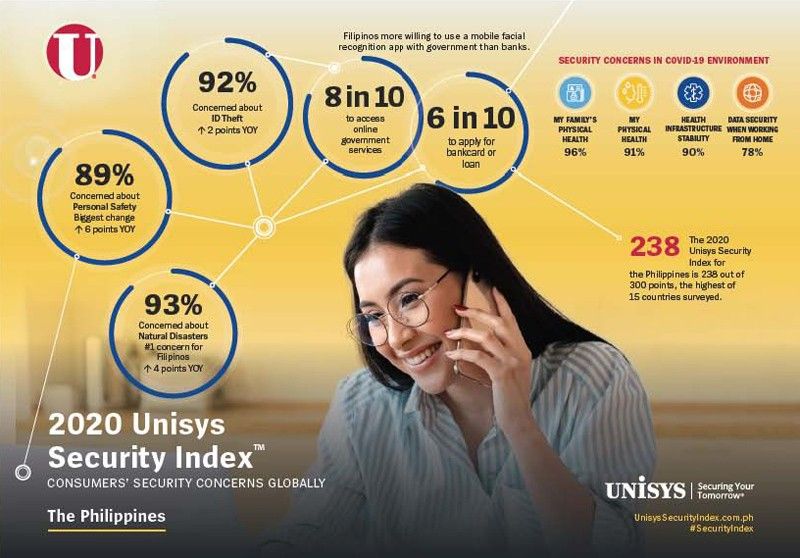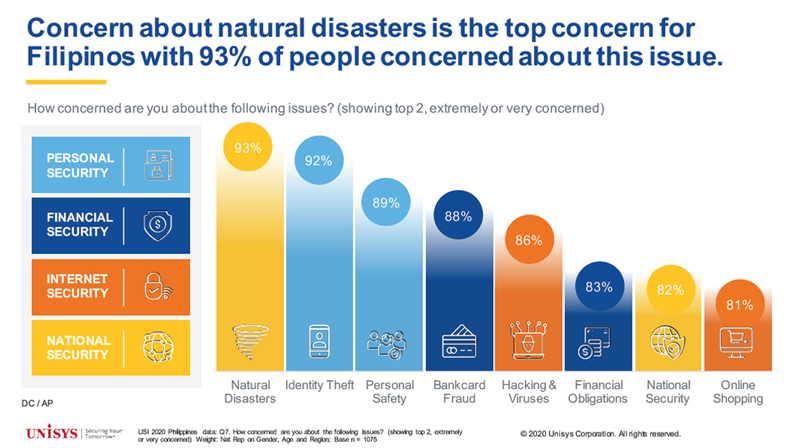How governments, companies can address evolving needs of increasing tech-savvy Filipinos

MANILA, Philippines — This pandemic has forced more and more Filipinos to become digital, not just with remote work and education, but even with the way they avail of products and services. As the number of tech-savvy Filipinos increases, their needs also change, which if not addressed, could result in related security concerns.
The 2020 Unisys Security Index™ reveals that even in a pandemic-ridden world, Filipinos are almost as concerned about identity theft at 92%, as they are about natural disasters at 93%.
“These findings reflect a year when a slew of natural disasters dominated news coverage and personal experience for most Filipinos such as the Mindanao earthquakes, Taal Volcano eruption, Typhoon Tisoy, and most recently the COVID-19 global pandemic. But even so, Filipinos are very aware of, and concerned about, identity theft,” Daphne Chee, director of Security at Unisys Asia, told Philstar.com.

The Unisys Security Index is the only regular snapshot of security concerns conducted globally. This year, surveys were conducted at the height of lockdowns and strict measures to counter the spread of COVID-19 around the globe.
Of the 15 countries surveyed, Filipinos continue to record the highest level of concern about security issues, ranging from personal, national, financial and internet security.
“When looking specifically at the impact of the COVID-19 global pandemic to the Philippine public, they are most concerned about basic health needs with nine in 10 seriously concerned about the physical health of their family (96%), their own health (91%) and the stability of the nation’s health infrastructure (90%). And they are slightly less concerned about their personal financial security and the nation’s economy or their job security,” Chee said.
“The thing that concerns Filipinos least about the impact of the pandemic is the risk of a data security breach while working remotely—they likely assume their employer will take care of securing data and systems in the ‘new normal’ of the work-from-home (WFH) environment. This is understandable as they have other priorities on their mind. However, this is a red flag to employers that they must adopt a security strategy that treats people as their weakest link in security,” Chee explained.
The Philippine report also saw increasing concern about two types of digital security issues: bankcard fraud, up from 84% of Filipinos in 2019 to 88% in 2020; and identity theft, up from 90% to 92%.

As businesses and governments look for new ways to deliver services digitally in the Philippines—via the internet and mobile apps—they must take into account the high public awareness and concern about data breaches that can lead to identity theft and bank card fraud. They need to build trust by showing how they will protect sensitive customer and citizen information—not only by preventing data breaches but also by minimizing the impact if they do happen.
Ashwin Pal, director of Cybersecurity at Unisys Asia Pacific, explained, “Losing trust means that customers might go to a competitor or be reluctant to use online services – for example, they might opt to change their bank or decline to use digital banking services. For public sector organizations, low trust could impact citizens’ willingness to use the government’s digital services which are critical for the ease of doing business in the Philippines—for individuals and businesses.”
He added that security concerns can hinder digital transformation initiatives. Due to this, benefits such as lower costs, greater serviceability, better reach among clients and citizens, and simply easier ways to do business will not be realized. Communication and transparency is key to build trust: promote the measures being taken to keep information secure.

So what measures can organizations take to improve their security?
Pal recommends three basic steps on how private and public institutions can manage security concerns:
1. Understand threat intelligence
Engage in basic research and find out what and how cybercriminals are targeting organizations in various industries and industry-specific to your business.
Then ask yourself if you are confident that you have the right security measures in place.
2. Awareness and cultural change
Your biggest security assets are your staff but they can also be your biggest vulnerability.
Educate your people to ensure that they understand the importance of cybersecurity and how to detect cybersecurity threats such as a suspicious email or a request to immediately pay an invoice that doesn’t quite look right.
3. Risk analysis
Understand risk posture based on the business’ activities. To do so, apply the following steps:
- Password management – Use strong passwords everywhere and as far as possible, use two-factor authentication that requires a password and as an example, a number sequence similar to what you see with internet banking.
- Privileged account management – Ability to control and manage privileged (administrative) accounts.
- Cloud Access Security Brokerage (CASB) – Control access to cloud services and exercise governance over this access.
- Web and email filtering – Ensure your email and web traffic are filtered by a security tool and threats?are?being removed.
- Advanced malware protection – Protect against malware using artificial intelligence, machine learning, heuristics and behavior-based engines to detect and eradicate advanced malware. This is distinct and better performing compared to traditional anti-virus protection that relies on signatures.
- Backup – Backup all data regularly and ensure the backups are air-gapped from production network. This will help recovery in the case of a ransomware attack.
- Application whitelisting – Select only a set of applications that can run on a given device.
- Incident response capability – Detect and respond to security incidents underpinned by a Security Incident and Event Management (SIEM) tool.
- Network security/segmentation – Segment your assets based on identities of information assets using micro-segmentation technology.
- Patch/vulnerability analysis – Apply security patches regularly to your information assets.
By gathering insights on consumers’ security concerns and behaviors, Unisys can impact organizations’ willingness to use different types of technologies or services that can address cybersecurity concerns. It can also lead in conducting risk analysis so that organizations can identify the gaps in their digital systems.
“Through a combination of advisory, technology and managed security services, we help organizations improve their cybersecurity posture to meet customers’ expectations and better protect personal data and digital identities,” Pal concluded.
***
Unisys is a global IT services company that delivers successful outcomes for the most demanding businesses and governments. Unisys offerings include digital workplace services, cloud and infrastructure services and software operating environments for high-intensity enterprise computing. Unisys integrates security into all of its solutions across the government, financial services and commercial markets.
Visit www.unisys.com.ph for more information.
- Latest































